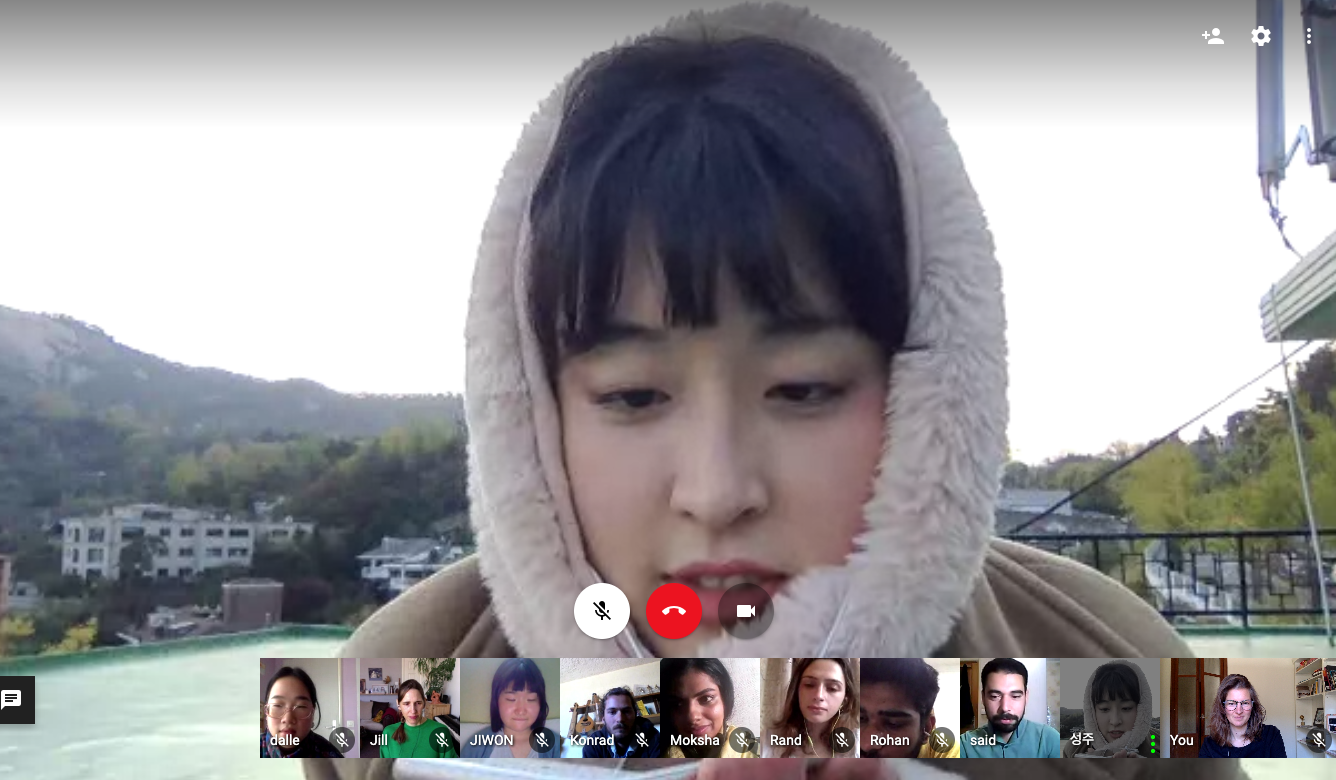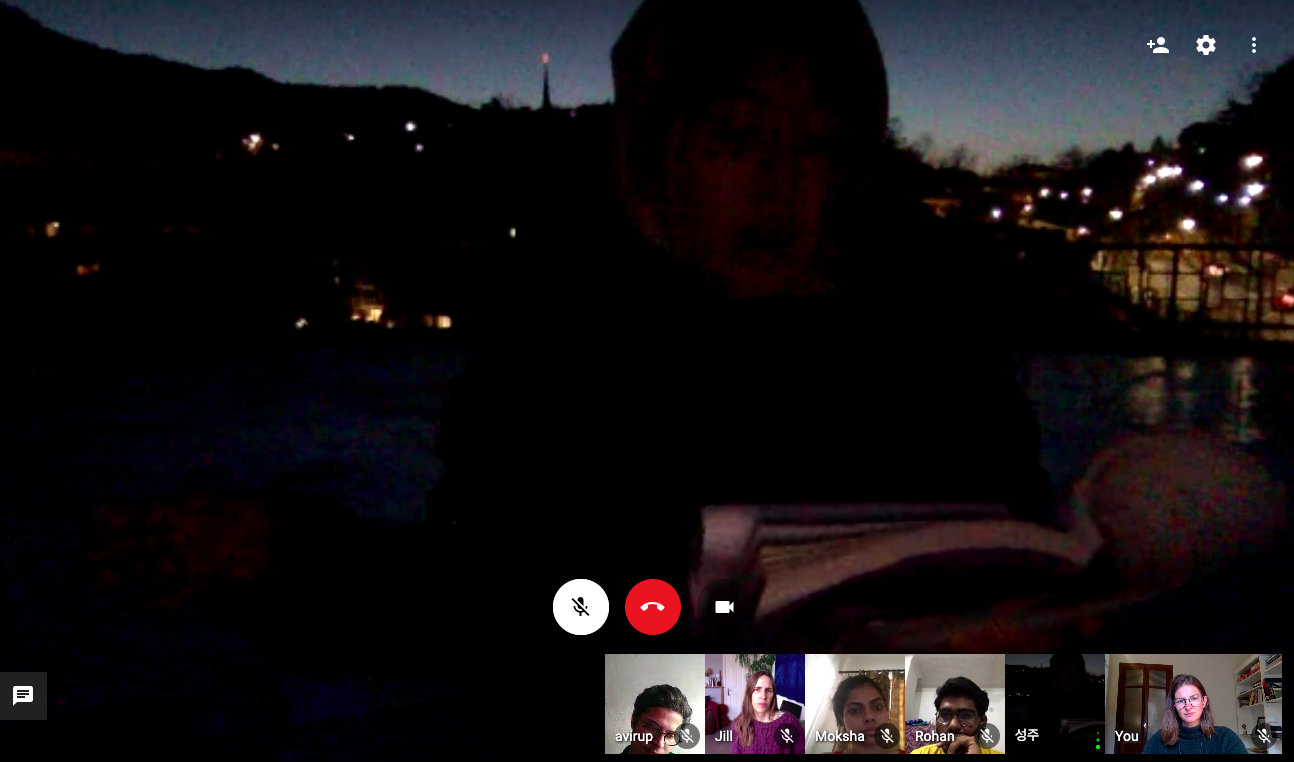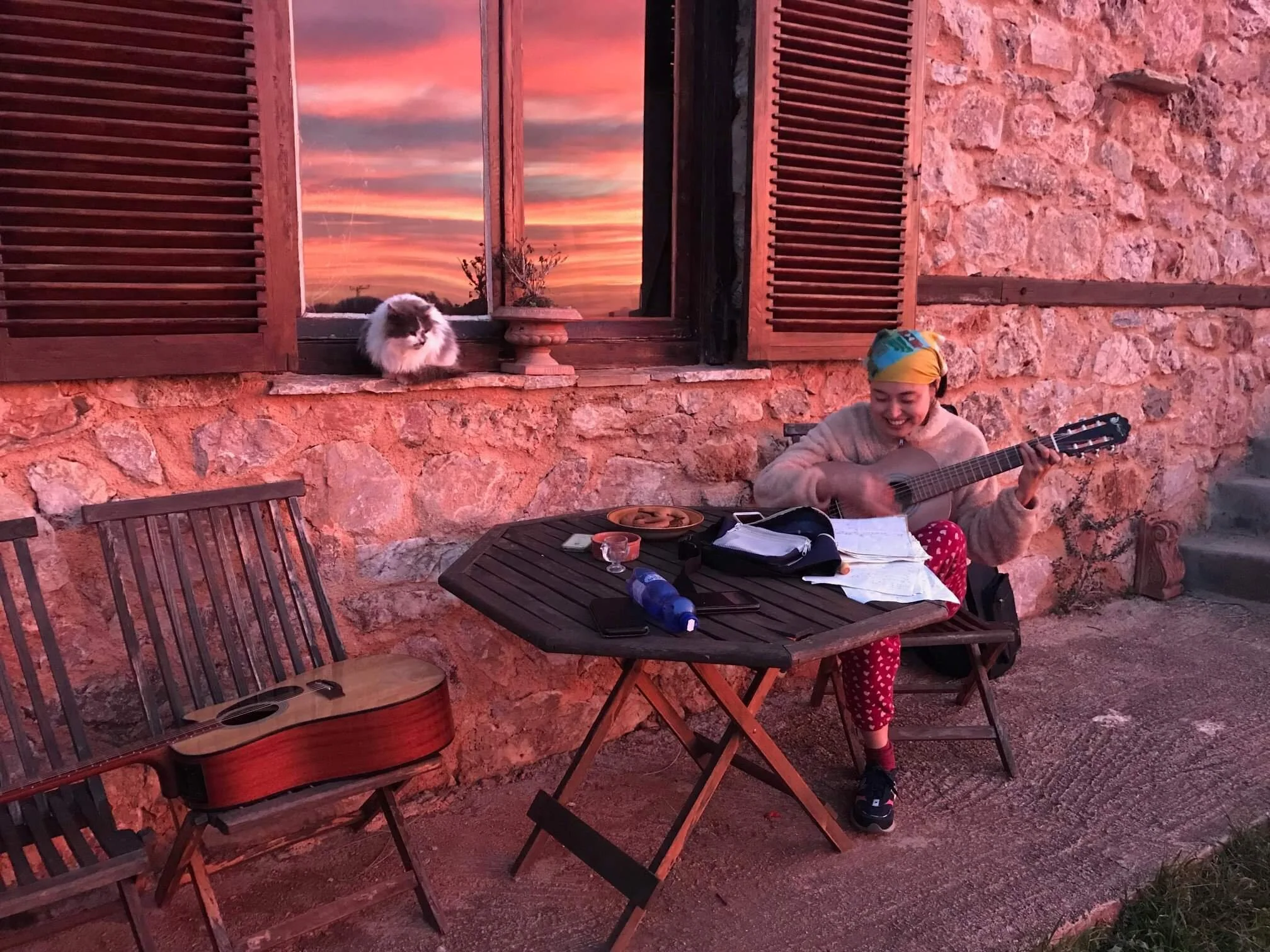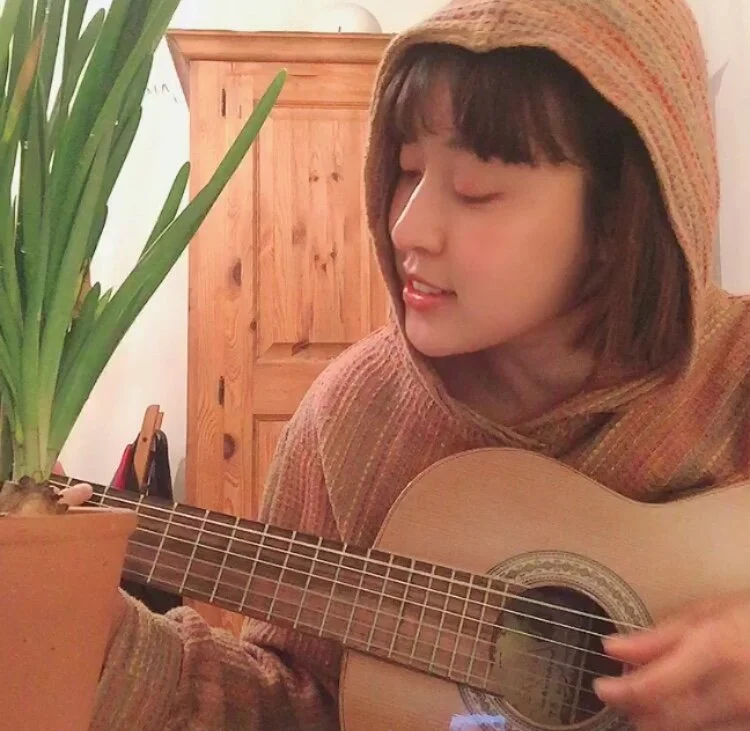Seongju Hong
In May 2020 I spoke with Seongju Hong, an artist from Seoul. She is a singer and a poet but to say those things doesn’t really say enough. I once likened her to a troubadour and she said she could relate to that. To understand her, it helps to know about her graduation show piece from École Nationale Supérieure d'Art de Paris-Cergy. She made cushions so that people could sit down and share in an event of songs and poetry. Afterwards (to the disappointment of her family, who had imagined artworks coming back with her from France) she gave the cushions away to the attendees. When she talks of this event, she describes the artwork not as being the cushions or even the poems, but a shared moment – a memory of an experience.
Tell me about what you do?
Seongju hosting an event entitled “To be here” in April 2020
I write poems and sing them and share with people around me, and more recently I have been discovering the singing voice as a language of heart. While I was travelling and sharing and singing, sometimes I sang my Korean poems, for example to a group of Greek people. I explained and translated a bit, but I felt that most of the time they understood the poem better in the original language. It seemed that this was because of the medium, the singing voice. And so, I feel the need to go deeper with that. With the singing voice you express yourself directly.
Do you model your practice on anyone or anything, or is it something that has naturally evolved?
I don’t feel I have the capacity of modelling myself on someone or something, actually. It has naturally evolved, and that’s why the life I live, and the way I live it, is so important – to follow something I don’t totally understand and see what happens. I try to expose myself to people, their circumstances, without filters or pre-decision and without a predicted project. It’s pretty far away from efficiency.
How does the traveling happen?
I didn’t discover an interest in art until I was 22 years old and it was an accident, like falling in love.
I discovered little by little what art is for me and found out that, for me, life and art are one. I have to be fully in life to make a form out of it. I know I work this way. I could decide or plan but it wouldn’t work. It was natural for me to flow and allow life to come to me.
That’s also why I decided to travel about the world without plans. The initial desire was that I didn’t want to have a dwelling place. I wanted to experience life as a nomad, living to discover my body and myself without home, with nowhere to go back to. I told my landlord I was leaving and I went to other homes and worked – babysitting, farming – and it was important that I had a relationship with the place, people and culture in every place I went to. It has been really wonderful, every single place. I have this certainty in art and life. It’s like I want to be like a baby, constantly experiencing the world again for the first time.
We first met during a Virtual Residency, where you shared a beautiful story about the prefecture (an immigration building) in Paris. Can you tell me again what you did there?
Seongju performs a sung poem for a group of near strangers on the first day of her Virtual Residency. As the dusk fell around her the atmosphere was electric.
As a foreign student in France I had to renew my paperwork. I got a letter to go to the prefecture building in Cergy at 9am and when I arrived there with my paperwork I discovered a line of hundreds of people waiting. I realised it wasn’t going to be possible, and besides which I had to get to school, so I went back the next day an hour earlier. It was the same. The following day I tried 7am, and I waited two and a half hours, but when I got inside I was told I was missing a piece of paper and I’d have to start again.
I was shocked and curious at this long line of people standing at the prefecture. It was October or November and it was bad weather, starting to get cold. I felt that even though I was in France, I wasn’t yet allowed to be there, and here was an invisible border line. Or, a line that was only visible to the people who have to wait in it, because when the people who are allowed to be in France get out of bed we have all gone inside.
It opens for four days a week for foreigners, so I went on each of those four days for a month. My residency permit was due to expire at the end of the month and I realised if I started the renewal procedure before the expiration date my mindset would be different, I wouldn’t feel the urgency that others were feeling, so I waited til the last moment.
While I was waiting I had nothing to do so I started writing what happened each day. One day was so cold I didn’t talk. Another day it was a long wait and a guy asked me to keep his spot so he could take a shower. Another day I listened to a group of guys talking about news of their homelands, which I didn’t understand well. I just wrote all of these things down without opinion, just put down what I lived.
I started going each day at 6am until 9am. When I woke up late I was late, and sometimes I would go early, say 4am, to see who is first. I always asked the first person what time they had arrived.
Once I had my permit I didn’t know what to do, whether or not to continue. But the terror attack (at the Bataclan Theatre) stopped me. I was eaten up by shock and sadness, and also by relief that I was okay, and then a disgust at my own relief. Anyway, that stopped me.
Then a couple of months later I started thinking about the prefecture again. I wanted to share what I’d lived with the people who were living the same thing. I made a prefecture journal – twenty pages of my diary entries and things I had written down, a picture of my ticket for a given day (everyone takes a ticketed number when they arrive). It’s a personal diary with grammar faults left in it, and at the end there is an email I exchanged with the prefecture. I printed the journal and I filled a basket trolley with copies of it, and candies. I put a note on the back to whoever was reading that they could leave me a written note in the journal if they wanted to, I urged them not to hesitate. Then, I went to the prefecture every week, two-three times a week in the morning for seven months to install the basket trolleys. A note attached beside each basket stated that it wasn’t anything weird, and that I would come back to pick them up before the prefecture opened, and to have a nice day. Then I would hide in a bakery next door. My Asian name was written on it and there were not many Asians hanging around. I hid so they didn’t see me, and know it was me, to avoid affecting their experience. I would return twenty minutes before opening. But after seven months, a physical illness stopped me.
So many things happened in those seven months!
My next question is about the way in which people respond to you, so please tell me what happened! I am aware that people like to set boundaries to understand what they are seeing or hearing, but you were outside of all those usual boundaries in so many ways – what was the response?
Actually, in the line people reacted very differently. Since I didn’t have any particular direction, I was just living this time. One day my legs hurt and there are no chairs, and I complained about this to a guy there who was waiting. He said I should make a video of the line and use that video to try and make things better. So I went to the line at 4am to try and take a video, but I couldn’t. Only very far away from the back, because people don’t want to be filmed. But I still wrote an email about conditions – what could be improved, and even how I could help. They (the staff) answered to say each of the things I had suggested was impossible – it was all impossible – but that they would do their best.
Others were happy to read a story while they were waiting. Others were angry at the circumstances. I got twenty-five written responses. Some of them were in the spirit of “I have to get out of this country.” One time I found all the journals stuffed in the trash. But there were really different reactions. Even the reaction of the police – they took it , read it and laughed. They called me over and asked “Is this yours? It’s no problem, here, take it back.” This kind of different reaction was interesting. I didn’t have a direction myself. This is the important part.
And did you form relationships with any of the people there, did you see the staff members from day to day?
Seongju with her basket of reading material
I didn’t have much of a relationship because I left the trolley, and then I came and collected it. Then the relationship changed two and a half years later. I went back to Korea for medical treatment. When I returned I had a feeling that I had stopped abruptly. I wanted to end it smoothly, for myself. So I started going to wait in line with no urgency or intention. Just to think about how to end it, or to continue somehow. While I was there doing the line I didn’t feel good. I went there for no real reason and others were there in urgency, it felt uneasy somehow. So I put a little paper note on display in a few places that said that if someone was in difficulty and they wanted me to stand in line for them, I could do that for one person on any Tuesday, Wednesday or Friday. Nobody called, and then after two weeks I got a call from the police. They thought I was trying to charge people to stand in line on their behalf. I had to go to the police station. I brought my printed journal, I explained, and they agreed that I was free to go, that I hadn’t done anything wrong, but said that I had to be careful with the prefecture.
Some time later, I had to renew my residency permit card and went to another prefecture, and there was a problem. My record states that I am someone that has illegally sold placeholders in the immigration line. They gave me the permit card, but said that it will be hard to do it again and, and maybe hard for me to try and live in France in the future. The woman who told me stared at me right in the eyes, really looked at me in a way that I had never been looked at by a stranger, and I knew I wouldn’t change her mind.
What will you do? Is it a problem for you?
It’s not the end of the world. I have a place to go back to. I have a passport that lets me go to as many countries as I want. But I was shocked. And also at myself, because the action of propositioning people to wait on their behalf, I didn’t even think much, I just wanted to help. I was shocked that I wasn’t careful enough for myself and whoever might have received that help. It started my thinking about generosity. Specifically about generosity coming too easily – what I proposed had become violent. Simplicity had become violence.
I started writing a poem about this, the one I shared on the first day of the virtual residency. It’s not sad or happy, but it’s something that happened. It was the first time someone looked at me as a total stranger, a "bad outsider". A friend, a Morroccan woman, told me she gets that stare every time she goes to prefecture. I realised how different it is for her. Until then I was only seen as an international student and nothing more.
I remember hearing that poem at the residency. It was the first day of your group, you were the first to present. Tension can be a little high the first day as we don’t know each other yet, and you seemed to clear any fears with your sung poem. The intimacy of your voice seemed to set the tone for the whole group. It was beautiful.
Thank you.
What was it like taking part in the virtual residency?
I knew it would be amazing before I did it because it was all for people who believe in art – who want to live this moment in time through art. This was a certain thing for me. That fact alone was enough to let me believe in it. When people with different energies are mutually inspired, it’s like I have a garden and there are new plants popping up that I didn’t plant. It’s wonderful to see the flowers and the fruits, like Moksha (Kumar @vratya.m.art) who made a visual text of the collective words we sent her. And Avirup (Mukherjee @avirup.mukherjee_) who started making videos with his poems, and my poems. The desire just came to him, he hadn’t done that before. They were new plants popping up – entire moments of waking up thinking of this garden shared by you all, and to actually share the water, the sunlight, and the shade, this whole time was very magical and thankful.
After the virtual residency I started holding online gatherings. It’s so joyful and magical to share a moment to believe in art and have a desire to share their world with others. I realised how magical things happen when there is this place, the place of the online gathering. It’s been four weeks, every Friday. It’s amazing. The first we shared poems, the second time was music improvisation, the third we wrote together and in the fourth we shared any form of landscape.
Now the lockdown has changed and people have started their everyday lives again. I want to pause and think about how to continue with the gatherings, the timing, giving people a place where they can come with an easy heart through an open door.
What do the immediate and long term future hold for you?
I plan to continue writing text and songs to discover the heart language (the language of the singing voice) and continue with the gatherings for now. And, I’m also thinking of applying to the Seoul Citizen Theatre Troupe. I’ve never tried acting but I’ve wanted to experience it for a long time. I’m not that good at being honest with myself, I grew up like that, so it would be interesting to have another personality to cry out the honest part of me.
Long term I guess it's a continuation of hospitality and my art and my everyday life. We talked about my graduation show. Well, as a human I struggle with the issue, that no visual trace is left behind, to share my works indirectly. How do I go forward with this direction? This is the question I have to answer along the way. I have been holding onto a phrase by the Argentinian pianist Margarita Fernández, she talks of “melodies that bind lost hopes and future times.” I hold on to this tightly. This kind of melody is something I want to write and to sing and share.
Visit Seongju’s website to read more about her adventures, or follow her instagram.









